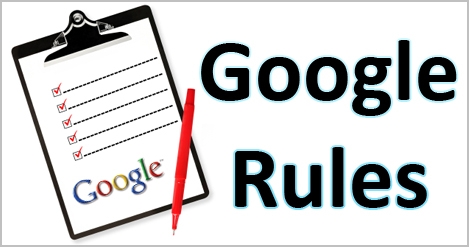Whether we like it or not, Google has appointed itself judge and jury of the Internet. Thanks to their position of power, they are free to set their own rules regarding the findability of your websites and/or advertisements. Rules that unfortunately are not clear to every entrepreneur or marketer. And are they clear, are the rules properly enforced?

How important is it to follow Google's rules?
Google wants users to find Web sites that a) are most relevant to the search query and b) receive the most organic traffic. Based on those two requirements, search results are displayed. The downside of this method, however, is that if Google calls a Web site the "best," you may not find it at all.
Anyway, we can't make much more of it either. In the end, of course, Google is just a (very clever) algorithmic machine that will never have a human "touch. It will always act according to a set of predetermined rules to rank Web pages in search results.
That means if we marketers want to compete in the SEO "battle," we just have to play by the rules to get a high ranking.
So let's see in what ways the rules are often broken now (and to what extent this applies to you):
Your website is basically your company's business card. No matter what you sell, be it goods or services, you can never have enough information on your website.
With free information, you should make it clear what added value you offer visitors. Think product descriptions, blogs, photos or details of your service.
This means writing regularly. If you do not post new information regularly, you are breaking Google's rules. Google wants to see that you keep providing visitors with new information.
The best thing, of course, is to blog regularly. If you don't have time for this, share articles from other bloggers, and write a short reflection on them yourself.
If you're still basing your content on the old keyword "game," it's high time to change this strategy. The value of content is much more important. Valuable content is content that people can literally take with them. For example: how-to blogs, a white paper or an e-book.
If you don't provide your tweets, updates and blogs with better information than just continually repeating your products or services, you are breaking Google's rules and you will see your website drop in the rankings in no time.
Link building is one of the most crucial things you need to have in place for SEO. The problem is that it is very difficult to do it properly (and legally). But the answer lies in the above already mentioned two points: content. If you have good content, other websites will link to your website.
Link building can be that simple, but how do you get others to link to you?
You can start guest blogging, pay for links or ask your friends to link from your website. Sounds very simple, but in practice this is very difficult. Poor link building makes it very difficult to get higher in the rankings.
Link building must come from both sides. As much attention as you give to inbound links, you should also give as much attention to outbound links. Why? Because Google likes to see that you provide users with as much interesting information as possible, whether you wrote it yourself or not.
It is important that you also link to other websites on your website. Google then also looks at the PageRank of the linked page. So link especially to "big" websites.
CAUTION: Do not link to spam websites. Then you break Google's rules, even though you yourself may not even have known you were linking to spam.
A mobile-friendly website is necessary for a good ranking in Google. Of course, you've already noticed yourself that the online world is shifting more and more to mobile. Chances are you're even reading this article on your smartphone or tablet. Google also noticed this change. Since April this year, Google "penalizes" you if your website is not mobile-friendly. More information about the mobile friendly tag can be found in our blog about this update.
At the very least, you should make sure your website is responsive. Fortunately, Google has a page where you can test whether your website is mobile-friendly enough.
If your website is not mobile-friendly, then' you are breaking Google's rule and you will notice it in your SERP. So check your website quickly!
How else are marketers breaking Google's rules? Let us know!
